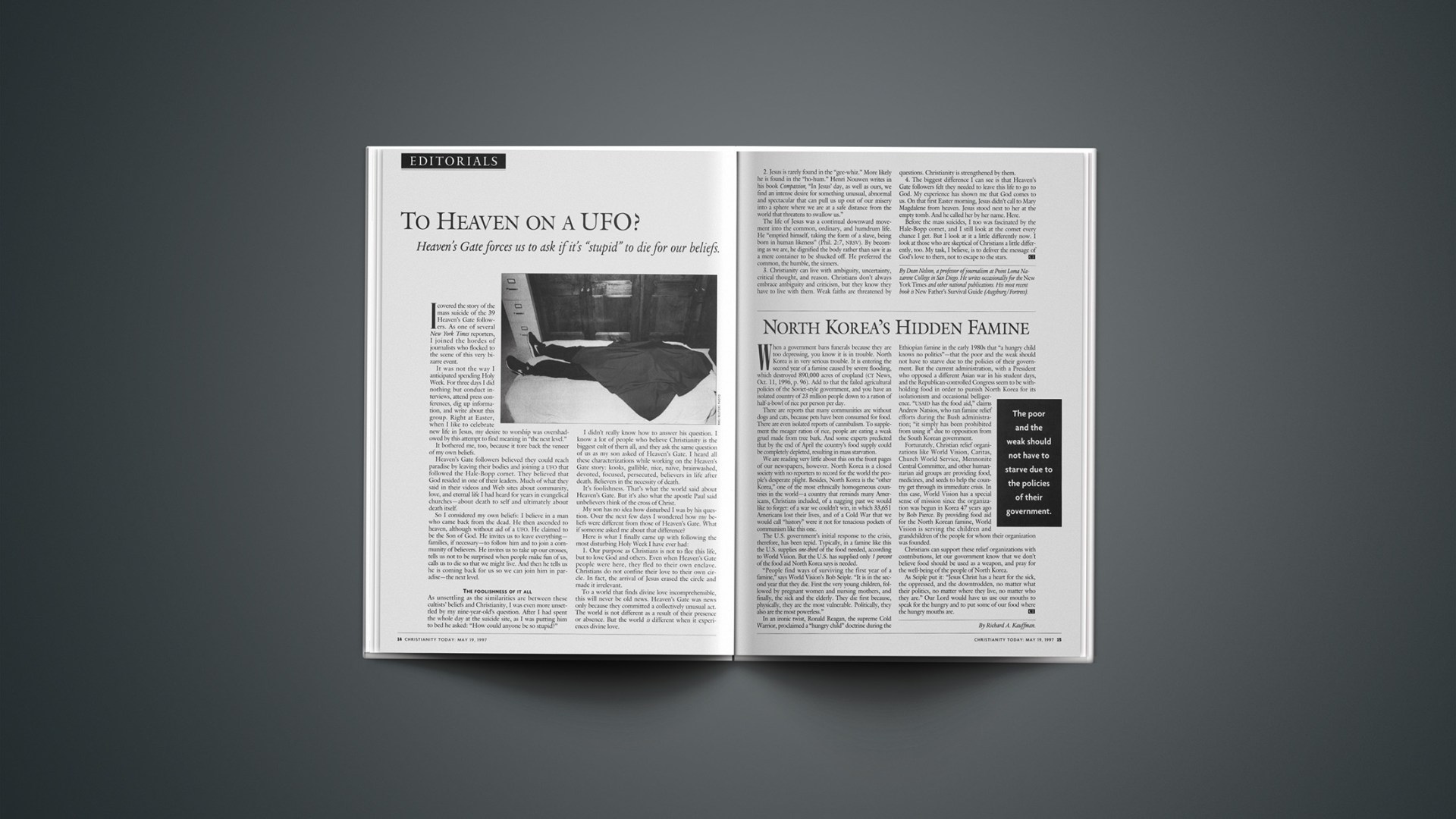I covered the story of the mass suicide of the 39 Heaven’s Gate followers. As one of several New York Times reporters, I joined the hordes of journalists who flocked to the scene of this very bizarre event.
It was not the way I anticipated spending Holy Week. For three days I did nothing but conduct interviews, attend press conferences, dig up information, and write about this group. Right at Easter, when I like to celebrate new life in Jesus, my desire to worship was overshadowed by this attempt to find meaning in “the next level.”
It bothered me, too, because it tore back the veneer of my own beliefs.
Heaven’s Gate followers believed they could reach paradise by leaving their bodies and joining a UFO that followed the Hale-Bopp comet. They believed that God resided in one of their leaders. Much of what they said in their videos and Web sites about community, love, and eternal life I had heard for years in evangelical churches—about death to self and ultimately about death itself.
So I considered my own beliefs: I believe in a man who came back from the dead. He then ascended to heaven, although without aid of a UFO. He claimed to be the Son of God. He invites us to leave everything—families, if necessary—to follow him and to join a community of believers. He invites us to take up our crosses, tells us not to be surprised when people make fun of us, calls us to die so that we might live. And then he tells us he is coming back for us so we can join him in paradise—the next level.
The foolishness of it all As unsettling as the similarities are between these cultists’ beliefs and Christianity, I was even more unsettled by my nine-year-old’s question. After I had spent the whole day at the suicide site, as I was putting him to bed he asked: “How could anyone be so stupid?”
I didn’t really know how to answer his question. I know a lot of people who believe Christianity is the biggest cult of them all, and they ask the same question of us as my son asked of Heaven’s Gate. I heard all these characterizations while working on the Heaven’s Gate story: kooks, gullible, nice, naïve, brainwashed, devoted, focused, persecuted, believers in life after death. Believers in the necessity of death.
It’s foolishness. That’s what the world said about Heaven’s Gate. But it’s also what the apostle Paul said unbelievers think of the cross of Christ.
My son has no idea how disturbed I was by his question. Over the next few days I wondered how my beliefs were different from those of Heaven’s Gate. What if someone asked me about that difference?
Here is what I finally came up with following the most disturbing Holy Week I have ever had:
1. Our purpose as Christians is not to flee this life, but to love God and others. Even when Heaven’s Gate people were here, they fled to their own enclave. Christians do not confine their love to their own circle. In fact, the arrival of Jesus erased the circle and made it irrelevant.
To a world that finds divine love incomprehensible, this will never be old news. Heaven’s Gate was news only because they committed a collectively unusual act. The world is not different as a result of their presence or absence. But the world is different when it experiences divine love.
2. Jesus is rarely found in the “gee-whiz.” More likely he is found in the “ho-hum.” Henri Nouwen writes in his book Compassion, “In Jesus’ day, as well as ours, we find an intense desire for something unusual, abnormal and spectacular that can pull us up out of our misery into a sphere where we are at a safe distance from the world that threatens to swallow us.”
The life of Jesus was a continual downward movement into the common, ordinary, and humdrum life. He “emptied himself, taking the form of a slave, being born in human likeness” (Phil. 2:7, NRSV). By becoming as we are, he dignified the body rather than saw it as a mere container to be shucked off. He preferred the common, the humble, the sinners.
3. Christianity can live with ambiguity, uncertainty, critical thought, and reason. Christians don’t always embrace ambiguity and criticism, but they know they have to live with them. Weak faiths are threatened by questions. Christianity is strengthened by them.
4. The biggest difference I can see is that Heaven’s Gate followers felt they needed to leave this life to go to God. My experience has shown me that God comes to us. On that first Easter morning, Jesus didn’t call to Mary Magdalene from heaven. Jesus stood next to her at the empty tomb. And he called her by her name. Here.
Before the mass suicides, I too was fascinated by the Hale-Bopp comet, and I still look at the comet every chance I get. But I look at it a little differently now. I look at those who are skeptical of Christians a little differently, too. My task, I believe, is to deliver the message of God’s love to them, not to escape to the stars.
By Dean Nelson, a professor of journalism at Point Loma Nazarene College in San Diego. He writes occasionally for the New York Times and other national publications. His most recent book is New Father’s Survival Guide (Augsburg/Fortress).
Click here to go to the expose from Watchman Fellowship—Heaven’s Gate Info
Copyright © 1997 Christianity Today. Click for reprint information.










